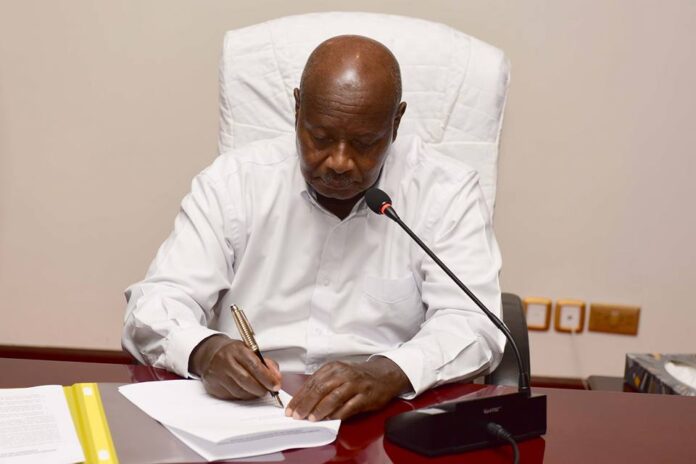President Yoweri Kaguta Museveni has signed the Uganda Peoples’ Defence Forces (Amendment) Act, 2025 into law, introducing major reforms to the military’s structure and legal framework. The act, however, has sparked concern among human rights advocates and opposition leaders over a new clause that allows civilians to be tried in military courts under undefined exceptional circumstances.
In a statement released by Parliament on Monday, 16th June 2025, it was confirmed that President Kaguta Museveni has assented to The Uganda Peoples’ Defence Forces (Amendment) Act, 2025.
UPDF deputy spokesperson Col Chris Magezi welcomed the move, calling it a noble and patriotic duty that would ensure discipline in the defense forces and improve national security.
“Violent armed criminals will be deterred, and Uganda will be safer. Excellent for business!” Col Magezi noted.
The act introduces several key changes, including the creation of a Directorate of Military Prosecutions and the formal establishment of the General Court Martial. Senior officers qualified to serve as judges of the High Court will now hold these positions.
One of the most controversial parts of the law is Section 117A, which allows civilians to be tried by military courts under exceptional circumstances.
According to human rights lawyer Nicholas Opiyo, this language is vague and could lead to abuse.
“The bill does not define what exceptional circumstances means, leaving it to be guessed,” he noted, warning that even contractors or service providers could be affected.
The Leader of the Opposition, Joel Ssenyonyi, has strongly criticized the law and has announced that they plan to petition the court over the law, calling it a sham.
He accused Parliament and the executive of ignoring the required legal procedures and failing to give enough time for public consultation.
Ssenyonyi reaffirmed the opposition’s determination to challenge the law, stating, “We are taking this to court. This law cannot be allowed to remain in place.”
Despite the criticism, the UPDF Amendment Act also includes provisions aimed at enhancing the welfare of military personnel. These include a new military pension scheme and the right to medical treatment locally or abroad.
Additionally, the act formally recognizes the Special Forces Command (SFC) as one of the four main branches of the military, alongside the Land Forces, Air Forces, and Reserve Forces.
As Uganda moves forward with implementing the UPDF (Amendment) Act, 2025, the nation stands at a critical crossroads, seeking to strengthen military capacity while safeguarding civil liberties amid growing legal and public scrutiny, particularly over the interpretation and application of Section 117A.















